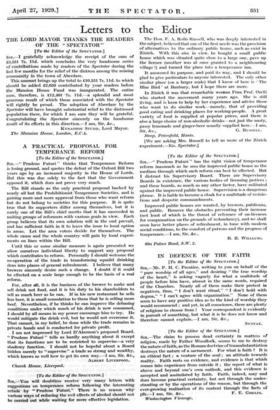A PRACTICAL PROPOSAL FOR TEMPERANCE REFORM
[To the Editor of the SPECTATOR.]
SIR,—" Prudens Futuri " thinks that Temperance Reform is losing ground, and quotes the defeat of the Oxford Bill two years ago by an increased majority in the House of Lords. But this was due solely to the fact that the Government opposed it, which does not prove very much.
The Bill stands as the only practical proposal backed by nearly all but the Prohibitionist Temperance Societies, and is gaining more and more approval from those who want reform but do not belong to societies for this purpose. It is quite true that its supporters differ among themselves, but it is surely one of the Bill's chief merits that it has succeeded in uniting groups of reformers with various goals in view. Each group believes that its own solution will in the end prevail, and has sufficient faith in it to leave the issue to local option in areas. Let the area voters decide for themselves. The whole cause and the whole country will gain by local experi- ments on lines within the Bill.
Until this or some similar measure is again presented we allow ourselves individual liberty to support any proposal which contributes to reform. Personally I should welcome the co-operation of the trade in transforming squalid drinking dens into places of general refreshment. I believe that many brewers sincerely desire such a change. I doubt if it could be effected on a scale large enough to be the basis of a real reform.
For, after all, it is the business of the brewer to make and sell drink not food, and it is his duty to his shareholders to sell as much beer as he can. If in his new restaurant he sells less beer, it is small consolation to them that he is selling more beef. Nevertheless, if he thinks he can improve the debasing conditions under which much of his drink is now consumed, I should by all means in my power encourage him to try. He would mitigate the drink evil, but he would not overcome it That cannot, in my belief, be done while the trade remains in private hands and is conducted for private profit.
I am not impressed by Lord D'Abemon's proposed Board. "Pruden Futuri " tells us hardly anything about it except that its functions are to be restricted to supervise—a very shadowy function. I should not be hopeful about a Board bidden merely to "supervise" a trade so strong and wealthy, which knows so well how to get its own way.—I am, Sir, &c., ALBERT LIVERPOOL. Church House, Liverpool.








































 Previous page
Previous page